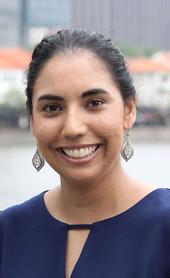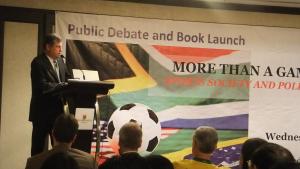Forum
Details
The KAS Political Dialogue Asia (PDA) office organised a book launch cum public debate on the 11th of June, a day before the official opening of the FIFA World Cup in Brazil. Dr Wilhelm Hofmeister, director of the PDA programme welcomed the room filled with sports enthusiasts with some thoughts on the perplexity of sports and how when we watch the games, we should know that it has consequences on society and politics as well. Sports is more than a game in this essence.
His Excellency, Luís Fernando de Andrade Serra, the Brazilian ambassador to Singapore, subsequently elaborated on these effects specifically with regards to the FIFA World Cup preparations leading up to the upcoming games in Brazil this year. For a country born to 200 million coaches, the World Cup has high expectations for Brazilians, especially with the obligation to win the cup. Nonetheless, even if Brazil does not win the cup, it has already reaped several positive outcomes especially pertaining to business and economic growth in Brazil, infrastructure development, security enhancements and social inclusion of the Brazilian community. As such the consequential impacts of sports onto society and politics cannot be understated.
After the introductory remarks, Mr Gerard Wong, director of Marketing and Communications, Football Association of Singapore introduced our invited speakers. First up was Dr Alexander Brand from the Johannes-Gutenberg University Mainz, who spoke in detail about the Europeanisation of football and national identity formation in Europe. He concluded with an argument for an increasing transnationalism of identities when it comes to football these days, citing the example of both Barcelona and Spain supporting the Basque country identity at their games.
Professor Wolfram Manzenreiter of the University of Vienna then proceeded to talk about how the game is organised and staged, with its multiple representational aspects from national identity formation to developmental prospects. He iterated that sports can be unifying especially since different countries play football for instance in the same format. But this has to be viewed on a spectrum where too much identification with sports can also be negative. He then cited examples such as the 2002 World Cup, jointly organised by South Korea and Japan that raised Asia’s profile as it was the first time FIFA held the championships in Asia and with two countries that have shared a problematic past. Overall, sports like football can be a good diplomatic tool but is largely symbolic and reactive in nature though gaining clout in areas of international cooperation with establishment of football clinics in Asia and Europe for example.
After an overview discussion of sports in Europe and Asia, Prof Fan Hong of the University of Western Australia spoke in detail about how sports have always been seen as an important aspect of Chinese nation building. In the late Qing era, a strong body form meant a strong army and as such there was strong emphasis on gymnastics. Subsequently, development of wushu (Chinese martial arts) motivated the Boxer rebellion in 1899. However the rebellion was not sustained and as such stronger emphasis was placed on sports schools to train the revolutionary forces. The Sino-Japanese war (1931-1945) saw a continued national focus on sports talent and community development. The Mao era also focused on the rhetoric of a strong body for nation-building by institutionalising military physical education. This focus on sports continued post-Mao era with China securing the top position in gold medals at the 2008 Beijing Olympics and 2010 Asian Games. However Prof Hong emphasised that such sports talent development is not without pressures on society and politics.
Last but not least, Dr Nicholas Giles Aplin, of the National Institute of Education Singapore, expounded on the strong sports ties Singapore and China share and debunked a few myths about sports in Singapore as well. He spoke strongly of the deep sporting culture Singapore has had pre-independence and post-independence especially. He shared about the positive developments that have taken place with regards to sporting grounds in Singapore from the Padang in 1889 to the latest Singapore Sports hub development with fully equipped sporting grounds and facilities from an aquatic centre to sports museum to a dedicated sports library. He concluded with some challenges to sports in Singapore and iterated that there is a need to remember the sportsmen and women of yesteryears, like twinkle toes – Mr Chia Boon Leong, a star footballer player in Malaya during the 1940s and 1950s, who was voted 19th on The Straits Times list of Singapore’s Greatest Sports Stars in 1999.
The event culminated with a freestyle soccer showcase by the Urban Street Style team who captivated the audience with their swift and nifty moves with the football. This was followed by a panel discussion with questions from the audience on the implications of the growing transnational identity of sports these days and the impending challenges of creating a cohesive sporting culture in societies that are fast losing touch with their sporting histories such as China and Singapore.
For more information on KAS events, do subscribe to us by sending us an email at pda.singapore@kas.de or like us on Facebook and stay updated on our latest developments!






